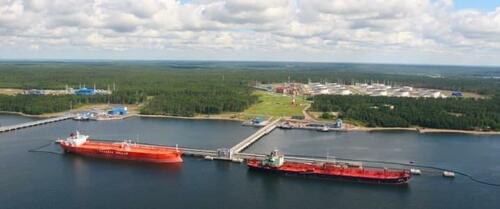EU Tightens Russian Oil Cap, But Loopholes Undermine Impact
Authored by Cyrill Widdershoven via OilPrice.com,
EU launches its 18th sanctions package, lowering Russia’s oil price cap to around $47.60/barrel and targeting the energy sector more aggressively.
Loopholes remain widespread, with Greek-owned tankers helping transport Russian oil, and non-OECD nations like China and India continuing to import above the cap.
Without stronger enforcement, including naval oversight and EU unity, sanctions risk being symbolic rather than impactful.
The ongoing push by EU countries to target Russia’s primary revenue source—oil and gas exports—has received a significant boost. With its 18th sanctions package, the EU has agreed not only to hit Moscow’s energy sector harder but also to impose a significantly lower price cap on Russia’s oil exports.
The package faced internal resistance, particularly from Slovakia, which had been blocking the deal over the past week. Slovakia’s current government holds a more pro-Russian stance and is concerned about the EU’s goal to phase out Russian gas imports in the coming years. EU Foreign Affairs Commissioner Kaja Kallas called it “one of the strongest sanctions packages against Russia to date,” stressing that each measure weakens Moscow’s war-making capacity.
France played a leading role in pushing for this round of sanctions. French Foreign Minister Jean-Noël Barrot said, “Together with the United States we will force [Russian President] Vladimir Putin into a ceasefire.”
Slovakia ultimately agreed to the deal after assurances that it would receive economic support should gas prices spike as a result of cutting off Russian imports by the end of 2027.
At the core of the new package is a 15% reduction in the oil price cap for third-party countries, set around $47.60 per barrel based on current benchmarks. While not a silver bullet, this aims to intensify economic pressure on Moscow. The G7’s original 2022 cap of $60 has proven largely ineffective, as non-OECD countries continue importing Russian crude—enabling Russia to maintain export flows and expand its “dark fleet” of uninsured, aged vessels.
The EU also sanctioned 100 more dark fleet tankers and is ramping up inspections in the Baltic Sea. A Russian refinery in India and two Chinese banks were added to the sanctions list. Yet Russia continues to exploit legal loopholes—often with the help of EU members themselves.
Consultancy Windward reports that Greek-owned tankers shipped 7.8 million of the 22.2 million tons of Russian oil moved recently. Despite the price cap, most Russian crude ends up in China and India—far above the permitted price.
Unless Brussels enforces these measures fully and holds member states like Greece, Cyprus, Slovakia, and Hungary accountable, sanctions will remain porous. Military enforcement, naval patrols, and a hard line against Russian hydrocarbon exports via EU waters are the only paths to real impact. Athens must step up, following the example of the Baltic and Scandinavian nations.
Loading recommendations...
